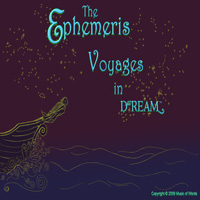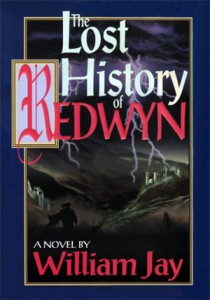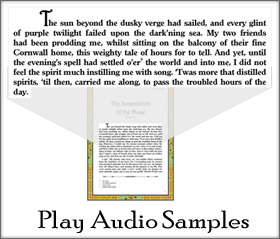Foreword by William Jay
It is difficult to tell history briefly, for history is as complex as human life, and an economical accounting inevitably results in a sketch comprised of incomplete and overly broad generalizations that will always have exceptions and be inaccurate in many ways. That said, I would like to offer such a sketch in an attempt to give a little background, however incomplete, to the times and philosophical underpinnings of the late Middle Ages, the setting for The Ephemeris and the period when the Renaissance was born.
The sun of our Western Civilization dawned over the islands of the ancient Greeks about 3,500 years ago. It burned across the Hellenic skies for almost 2,000 years, and the brilliance of the ancient Greeks shimmered like the sun upon their sparkling Aegean sea. The early Greek philosophers sought no less than to understand the cosmic order of the universe, the nature of all things and of ourselves. “Modern” in their methods (because we “Moderns” adopted them) these ancient philosopher-scientists laid the foundations of medicine, biology, genetics, mechanics, mathematics, Western art, music and drama. They posited a sun-centered solar system, atomic theories, a theory of evolution, and achieved in the philosophical exploration of thought and being so much more.
Their arguments about the nature of existence, perceptions of reality—what we know and how we know it—evolved over the centuries of their classical period. The mutability of the world and the difficulty of fixing a perception of reality in absolute terms led them to an impasse, of sorts, from which philosophers suggested that reality and therefore truth were things unknowable. Enabled by this, the school of Sophists (paid tutors) taught the language of philosophy as a rhetorical tool to be used for political or material gain. They suggested that, as beings lost in a sensory quandary of unknowable dimensions, comfort, sensory pleasure and relative satisfaction were perhaps the only definable goals we could achieve. After a long period of this intellectual drift, it could be argued, Greece, in particular it’s cultural and philosophical center, Athens, found itself in a crisis of “relativistic” decadence where human morality and ethics suffered to a perilous degree.
So powerful was the shaping influence of the ancient Greeks, that a single man, Socrates,‡ and his resolution of this philosophical and moral crisis taking place in Athens over 2,000 years ago had a lasting impact throughout the remaining history of our world. Thought by many of his contemporaries to be the greatest philosopher of his time, Socrates had been a Sophist originally, but he believed that Man had a higher purpose than merely to exist in the world of physical comforts and vague ideas. He suggested that we humans had a soul, a spiritual essence that had come from and would return to a supreme God. He believed that the divine part of us could lead us to reality and truth if we would only strive with good and purpose as our goals. He imparted these ideas to his pupil, Plato,‡ who taught that the sensory perception of the world of the physical was less real than the thoughts or Ideas that were inherent in that perception. They were God’s‡ Ideas, and we could participate in them because God had ordered our human mind to do so. We should strive to reach a higher plane of reality, he maintained, through the transcendence of the senses. Focus on the philosophical apprehension of objects through their Essences or Ideas would bring us to that higher plane. Plato’s famous student, Aristotle,‡ countered that a thing was comprised only of its physical characteristics; there were no inherent Ideas in objects, only specific properties about them that we could sense. Therefore, the only true reality we could know was through our senses, and understanding our world through objective observation of the material would lead us ultimately to reality and truth.
As this argument evolved, the difference between a reality reached through the mind primarily and one reached through the senses primarily would create a divergence in philosophy that would loom large at the Renaissance’s birth.
For a variety of reasons Greece fell (more accurately, Greece slowly dispersed into the “Hellenic Age”) and was absorbed by Rome. And when Rome declined and it, too, fell, Western Civilization descended into a lasting dark age, an age of barbarity and incessant war, of squalor, disease, and stifling ignorance. Through the church, we believed, we needed only develop our spirits to prepare ourselves for heaven and to understand our relationship to God; the outside world was something to endure through the trials of our mortality. Superstition and thoughtless religious strictures prevented us from studying and thus treating our own bodies for disease. The cataclysms of Plague and a myriad of other ills bred by overpopulation and filth threatened the very survival of our race. And when in our misery we turned to the Church to take comfort in our spiritual salvation, for perhaps spirit was the only pure thing left of us in the morbidity and corruption of our world, we found the Church itself had grown corrupt, and thus our bewilderment deepened into a dark, protracted epoch of despair.
Yet from this “epoch of our darkness” emerged the greatest era of progress ever known by Western Man. Indeed, of all the extraordinary achievements of this age that we now call the Renaissance, perhaps most salient among them is the triumph of the human will that was itself both phenomenal and essential to the Renaissance’s birth. How did it happen then that late in the Middle Ages when Plague was most rampant, in the depths of our overwhelming darkness and misery, that we found faith and purpose once again—and purpose not just earthly but divine? Well in simplest terms we “saw the light.”
It was a Dominican Priest, Thomas Aquinas, who focused on settling the ancient dispute between Aristotle and Plato, a dispute that had been carried on through the centuries and was very much alive in the Church of the late Middle Ages. He reconciled, as Socrates had done, by arguing that the spiritual must guide the intellect in its observations of God’s world. Faith, he said, was the key to finding truth. And the truth of nature would be revealed through the Holy Spirit that inspired and informed the searching mind.
Thus our Western gaze was turned outward again. And shortly thereafter, enabled by this enlightened view, Francesco Petrarch, an Italian scholar and Humanist led the way back to the ancient knowledge. We threw off the squalid cloaks of the Dark Ages and walked back into the Greek sunshine. And there we found the knowledge of the Beginning, virginal and pure. And from it we rebuilt our world, but with an added optimism that we were possessed of something godlike in our souls, a Holy Spirit that could illuminate our minds and allow us to participate, as Plato once had said, in the “Logos”, or, to the denizens of the Renaissance, in the active “Mind of God.”
And armed with the wisdom of our ancestors we set ourselves again to the Purposes most Grand: to understand the cosmic order of the universe, the nature of all things and of ourselves.
And now, is it possible we may at last complete the journey started by the ancient Greeks and carried forward by a great leap of faith out of the darkness of our darkest age? The cataclysms of infectious epidemics like the Plague have been largely beaten back. The human genetic code is mapped, and researchers may systematically conquer disease on its most fundamental, molecular level. Indeed, might we cure old age and even death itself? The once blurred vision of the cosmos seen through the ancient telescopes has grown ever clearer over the centuries until now we have stationed our instruments above the clouds, even peeled back the layers of space and time, and stare with impossible clarity at the first measurable instant of all things.
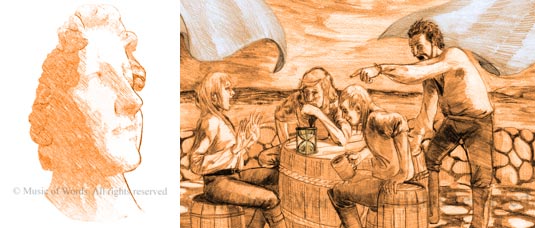
It was the Renaissance, informed by the ancient Greeks, that brought us here, out of the time of darkness into light. It was a belief that we were more than flesh, that the universe had purpose once again and in the end our quest would take us home to an eternal heaven and to God that brought us back to the Beginning—back to the dawn of space and time. And what we found there was the Singularity we once set out for in a giant leap of faith, where the infinitely large and the infinitely small are one; where dimensions outside of time seem a certainty, and all the rules of physical particulars melt down into a chaos of unknowable origin—before creation, without logic, without thought.
And although the fulfilled promise of the Renaissance and the ancient Greeks, to understand the fundamental nature of things, lies close, within our grasp. Although the great arc of Civilization has seemingly completed its journey through the heavens, come back to earth, and lies a single step now from our feet—we stand here, motionless, one step away. Our hand will not reach out to take the “Grail” that we have so long sought. For it seems we are confused, as by of our inquiry the nature of all things seems vague. Space has become time and time has become relative. Matter is no longer “solid” and thought may be as real as matter only seemed to be.
Perhaps this would not have surprised Socrates or Plato or Thomas Aquinas. However, it happened that Platonic ideals became less important in the objective Age of Reason, and the guiding “spirit” of the Renaissance was submerged in the objectivity of the Scientific Age. But the forces put into play by the Renaissance were powerful, and the machinery of the quest, like a forgotten probe launched into space, went on searching even after we had given up the spiritual component of its goal.
Thus, is it possible that we may have found the answer but forgotten the question? The great leap of faith that had impelled its asking was so long ago that we ourselves may have changed while trying to answer it, and perhaps the context of its asking has been lost. Do we stand once more in the ancient quandary of unknowable dimensions? To us, as to the pre-Socratic ancient Greeks, the physical universe is but a vague impression of the senses, and the senses are an impasse to the truth. We Moderns fear consciousness itself may be only an illusion, like a house of mirrors; and we stare at our own reflections in a deep and ever darkening despair. How will we move forward from an anthropic blind where we see only ourselves, and because we are alone all else is void? We are without purpose once again, and yet we cannot see what we no longer can believe.
Brueghel’s “Landscape with the Fall of Icarus,” painted in the time of the Renaissance, depicts a Ploughman focused on the tilling of his field while the epic event of the Fall takes place in the background. It is a Ploughman of the 1500’s, not of ancient Greece, and the depiction of Icarus’s legs as the only visible portion left of him disappearing into the sea is both comical and satirical. Brueghel was certainly commenting on the shortsightedness of his age, but what of ours? The great arc of our civilization may have landed at our feet, but our backs are turned to it. We wring our hands in despair of ontological uncertainty while the epic answer of all time may be a mundane step away.
Perhaps it is a step backwards we should take to remember the purpose of our impossible ambition—the Question from our past—that we might recognize the Answer we have found. Sometimes the path forward lies in knowing where we once had been. If the knowledge of the ancient Greeks was the light of the Dark Age, perhaps the spirit of the Renaissance is the beacon we should navigate back to—to remind ourselves of whence and why we came.
Thus, how the Renaissance may have happened for a few fictional characters living in the late Middle Ages is the story of The Ephemeris. It is remarkable how many of the modern scientific issues were discussed with insight by the Ancients and relumed by the inquiry of the Renaissance. It is the challenge of every generation of Mankind to recognize the barriers that prejudice and impede our progress and thought. It is usually the dogmas we are most comfortable with and least question that create, subconsciously, the prisons of our minds.
An Ephemeris is what the ancients used to chart the stars and record their journeys. If I have succeeded in charting a place in time or a slice of life, albeit fictional, by the efforts of this humble work, it is my sincere hope that after experiencing it your hand might rest a little steadier on the helm. After all, the world is round and you may trust, if you travel far enough, the far horizon always holds a shore.
W.J.
Disclaimer: All of the characters in this book are fictional. Apart from the exception noted in the credits, any resemblance by the illustrations or descriptions herein to any person, living or dead, is purely coincidental.
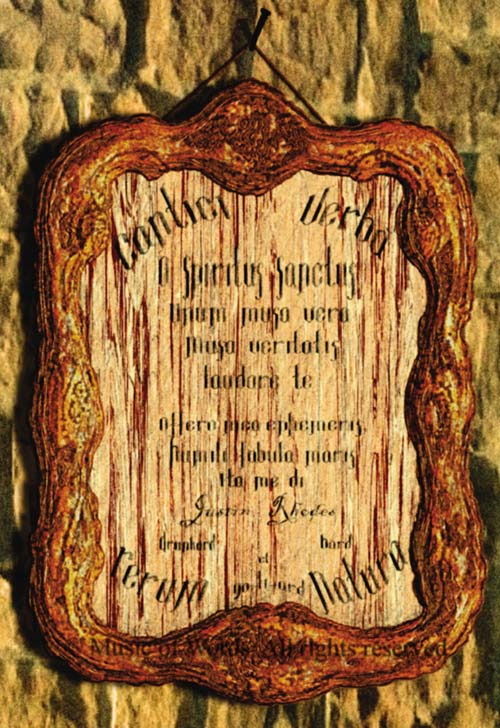
Justin Rhodes’ Playbill
Hung outside Taverns where he performed The Ephemeris.

